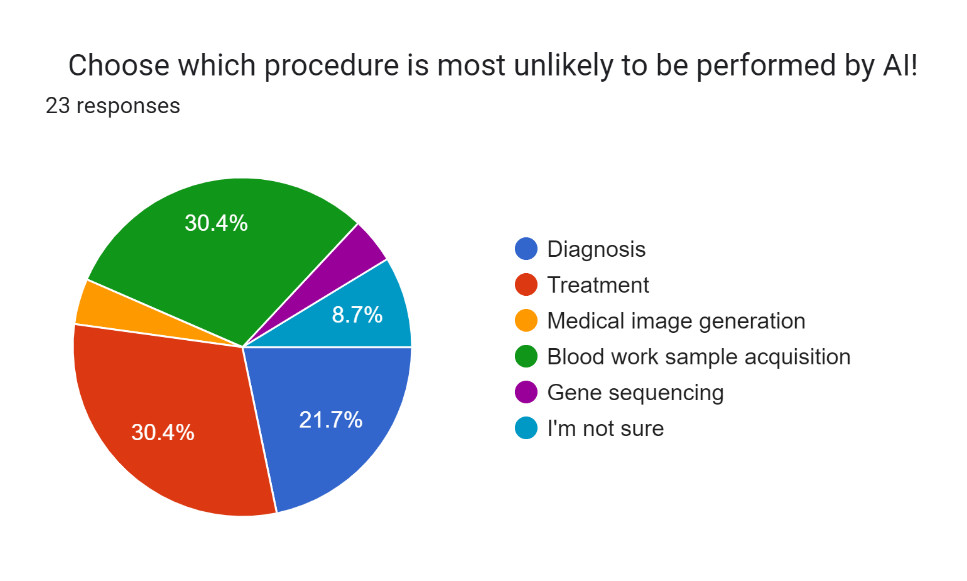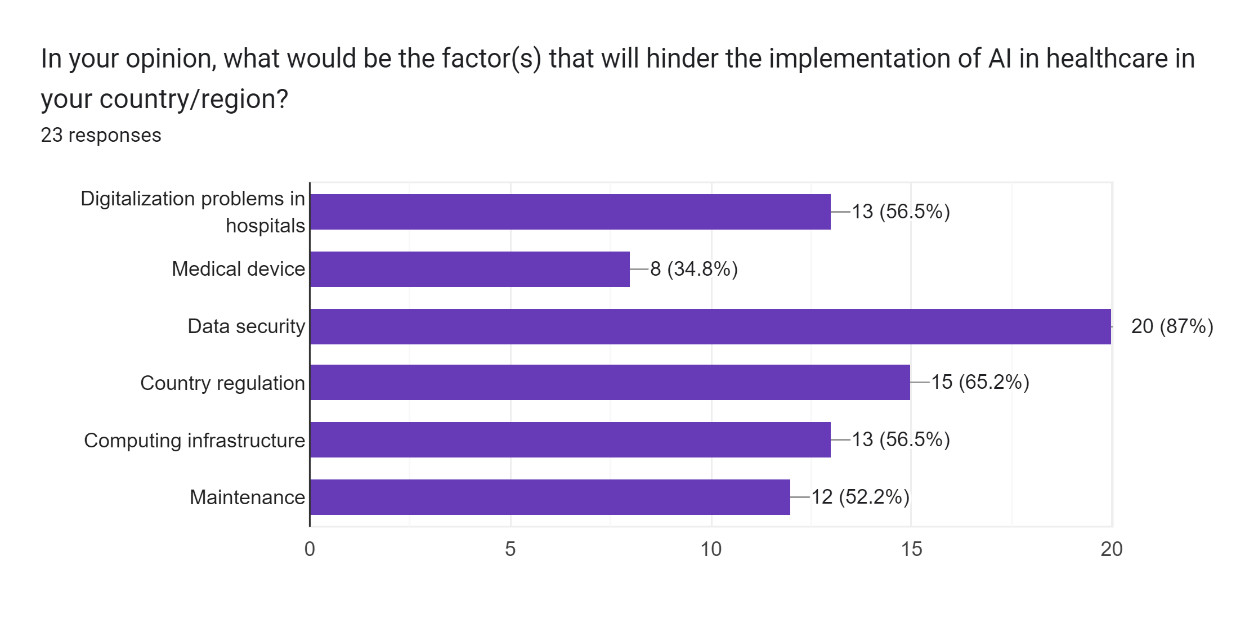The 22nd ASEAN College of Medical Physics (ACOMP) August 12, 2023 Lombok – Indonesia
Mohammad Haekal1, Hidetaka Arimura2, Kwan Hoong Ng3
1 Department of Informatics Engineering, University of Prof. Dr. HAMKA, Indonesia.
2 Department of Health Sciences, Faculty of Medical Sciences, Kyushu University, Japan
3Department of Biomedical Imaging, Faculty of Medicine, Universiti Malaya, Malaysia
The 22nd ACOMP workshop ‘How can we benefit from AI in the current renaissance?’ was held on August 12, 2023, as a part of the 21st South-East Asian Congress on Medical Physics (SEACOMP) and the 6th Annual Scientific Gathering of Medical Physics and Biophysics (Pertemuan Ilmiah Tahunan – Fisika Medis dan Biofisika/PIT-FMB) in Lombok, Indonesia. This workshop was a follow-up of ACOMP’s previous introductory workshops on AI. The workshop discussed various issues on the implementation of AI in medicine followed by a discussion on the impact of generative AI and its use in medicine. The session ended with an interactive discussions between the speakers and the panelists along with the audience on how can we make use of AI in our academic and clinical professions to create a better world.
The total number of participants is estimated to be 25-30 (based on the post-test response submitted by the participants).
The workshop was opened by Andreas Nainggolan as the MC for this workshop. He then introduced the chairman of the workshop, Prof. Kwan Hoong Ng.
Prof. Ng introduced the workshop objectives and then introduced the speakers.
A. Issues of Artificial Intelligence by Prof. Hidetaka Arimura
Prof. Arimura started his presentation by defining what is medicine, machine learning, and artificial intelligence. He also described the concept of how AI can learn from data and how AI system implementation was evaluated clinically.
Prof. Arimura then moved on to discuss issues on the implementation of AI, such as errors, overfitting problems, and the vulnerability of AI where AI is very dependent on the quality of the training data. There are also frame problems (AI understands problem limited to the “frame” of the training data) and symbol grounding problem, in which the AI system cannot make sense of an object nor understand the background of an object.
Prof. Arimura closed his session with a thought-provoking question of “Do human still need to learn when they can depend on AI for knowledge?” Prof. Arimura argued that, since AI is good at only one specific thing at a time, there are still a lot of subjects that AI will need to train for, and the training data came for human’s understanding of a concept. Therefore, humans still need to strive for learning new and meaningful knowledge for further development of humankind.
B. Introduction to Generative AI and Its Issues by Dr. Mohammad Haekal
The second session presented by Dr. Mohammad Haekal from the University of Prof. Dr. HAMKA discussed the issues in generative AI in medicine and healthcare. He showed a few examples of generative AI and the definition of generative AI. He then explained the types of use cases in which generative AI is implemented, then asked: how can generative AI be implemented in medicine?
Dr. Haekal explained the types of generative AI currently implemented in medicine. He explained by separating it into several pre-defined cases. He then highlighted the issues in generative AI which concern data (especially training data), bias, and intellectual property. There were also other concerns about imperfect training concepts and ethical implications of using generative AI in medicine. Dr. Haekal concluded by stating that while generative AI will no doubt hold high future potential uses; currently, generative AI still needs a lot of improvement before it can be implemented in medicine.
C. How Could the Next Generations Drive AI in the Current Renaissance? (Panelist Session)
The final session focused on how young researchers can use and direct AI to enhance their work and research. Four young participants were invited, namely:
- Takumi Kodama, doctoral student from Graduate School of Medical Sciences, Kyushu University, Japan
- Nur Diyana Afrina Mohd Hizam, doctoral student from Universiti Malaya, Malaysia
- Siti Aishah Abdul Aziz, faculty member of School of Health Sciences, Universiti Sains Malaysia, Malaysia
- Dwi Seno Kuncoro Sihono, faculty member of the Department of Physics, Universitas Indonesia, Indonesia
An online survey was carried out prior to this workshop. Highlights of the questionnaire and responses are found in the Appendix.
This session discussed mainly the responses to the questions in the questionnaire, from the perspective of the panelists as young researchers. The three speakers also pitched in their views and hopes as to what kind of advance can be accomplished by implementing AI carefully in medicine. There were also several questions from the audience directed to the panelists and speakers on their concern regarding the implementation of AI. The session concluded with the statement of hope from each panelist as to how they can utilize AI fully in their work and research.
| Q1. |  |
| Q2. |  |
| Q3. |  |
| Q4. | How do you think the implementation of AI will revolutionize the healthcare/medical industry and what will be the risk of the implementation? (18 responses) 1) It will be easier in case.of workload, but it is hard to differentiate what’s true and what’s not 2) Better diagnosis, faster process 3) Output accuracy 4) It will be oke 5) It will improve it making faster diagnosis and assist health care workers …however the risk is due to bad maintenance and upgrading in several countries and locations it will cause the downfall of health care as well as full dependence on Ai will lead to issues of the healthy workers won’t be able to work without it 6) I think it will help with automation 7) Generally it will help in some workflows but it means we hv to accept a higher risk 8) Increase treatment accuracy and throughput 9) Risk- data security, deceiving as in how much cn we trust ai. May revolutionise in terms of assisting healthcare workers and systems 10) The accountability of the output. 11) Faster, better, increase accessibility, improve healthcare equity. Misdiagnosis, legal issue 12) Lack of knowledge and malicious issues 13) It would shorten waiting time in diagnostics 14) Speed up our work. More effective image generation 15) Continuous maintenance and quality control of the accuracy and reliability 16) Automation of everything 17) AI will aid in the automation of some of the processes in the medical industry. Some issues on the implementation will most likely emanate from the lack of manpower who can develop and implement AI in the hospital. With each patient having different characteristics and each cancer having its own kinetics and rate of growth, and AI models are trained based on previous data, implementing this on specialized cases should be exercised with caution. 18) AI will help to resolved the patient waiting time problems at all general hospitals in Indonesia, but in the other side, if we fully dependent on AI, the patient security dan safety will be in danger |
| Q5. | After hearing the presentation, according to your understanding, what does a generative AI means? (19 responses) 1) It means data input from human, and generate an answer based on the inputs 2) AI that can create and learn 3) Production of data based on our input(s) 4) AI generated through learning 5) I am still the beginner, so I’m still learning 6) AI that you give it instructions to create data or image from scratch 7) Learn to painting continuously and learn like kids (Mimicking) 8) Creating A using B which may belong to different groups of object 9) Output of AI Machine 10) Generating an output from a given input within the given input data 11) It can generate output without input, just need some simple direction 12) It generate New data 13) Predicting and presenting a solution or answer 14) Conversion data 15) Learning data then solution. Recheck to see if its acceptable. 16) Training the computer to assist in repetitive tasks 17) Producing anything that we want but in a controlled environment 18) Using existing data to generate required information 19) Not all process depend on AI, human still be the one to decide the final conclusion |
| Q6. | After hearing the presentation, what do you think is the biggest issues on the implementation of AI in medicine/healthcare? (19 responses) 1) Data security 2) Ethics 3) In clinical setting, AI training is scarce hindering the adoption of AI. 4) Training data set to ensure output accuracy 5) Fantastic 6) Peopel who generate AI are not form healthcare 7) Data 8) Checking, qc and qa of ai and understanding ai 9) Acceptance and readiness of user 10) Trustworthy to the output of AI 11) The ethics, the accuracy 12) Reliability. Trust 13) How do we QA and commission AI to ensure safety abd accuracy? 14) Privacy, misscomunication, missinterpretation 15) Validity of AI output. 16) Quality control and continuous improvement of the AI 17) A reliable and secured data 18) Confusion 19) Trust to AI systems |
| Q7. | Based on your opinion, do you think AI will replace medical physicist job? (13 responses) 1) No 2) Yes to some extent 3) No. Physicist will have to learn some form of AI 4) Not replacing, just reducing the burden 5) Nope…this is due critical thinking and adjustment that comes with experience and understanding..AI has limitations on what we triang it but cases can come and go that are not common 6) I don’t think so 7) Maybe 8) No, but it can help the workload 9) Mainly no. Some aspects yes. 10) No, because data that used to training are come from diagnostics radiology/imaging 11) No. It will assist Med Physicist perform his work better 12) No. The basics and fundamental of physics & mathematics must be understand by Medical Physicist 13) Maybe the best word to describe was to help medical physicist job not replace |
| Q8. | As a researcher, how will you tackle the issues in AI implementation in medicine/healthcare? (15 responses) 1) Have to do regular training set 2) Continuity of the implementation 3) To think more like computer 4) I DON,T KNOW 5) Encourage and try to learn on working and using AI however insure no fill depending 6) No idea right now 7) Ai is just a tool to supplement never to replace. 8) Involve in research to understand the basic of AI 9) Data validation with the experts 10) Right implementation and knowing the limitations. 11) Not sure, need further research 12) One by one. Sensitise our hospital and staff. Eventually AI will improve and assist med/ healthcare. 13) Embrace it, learn it, use it and improve it 14) Not to use it freely but be learned as an applied tool to help our daily work 15) Deep understanding about the AI will help to expand the used of AI |
| Q9. | As a researcher, how far do you think we can use cloud to help us in AI implementation in medicine/healthcare? (14 responses) 1) Yes 2) To some extent 3) Database 4) It can help Medical Physicist 5) We can do trial and research to know that 6) Can 7) Wider application borderless 8) To some degree but not sensitive data 9) Limited for now, due to data security and lack of control issues. 10) It would benefit for patients 11) Help in data archival, safe manipulation, security 12) The potential is unlimited. It will foster a borderless collaboration and even the less resourceful country can achieve advanced care for their patients 13) I imagine that AI will aid in disease diagnosis and potentially help hospitals in treating more patients. 14) I cant really comment on this question, i m sorry |
